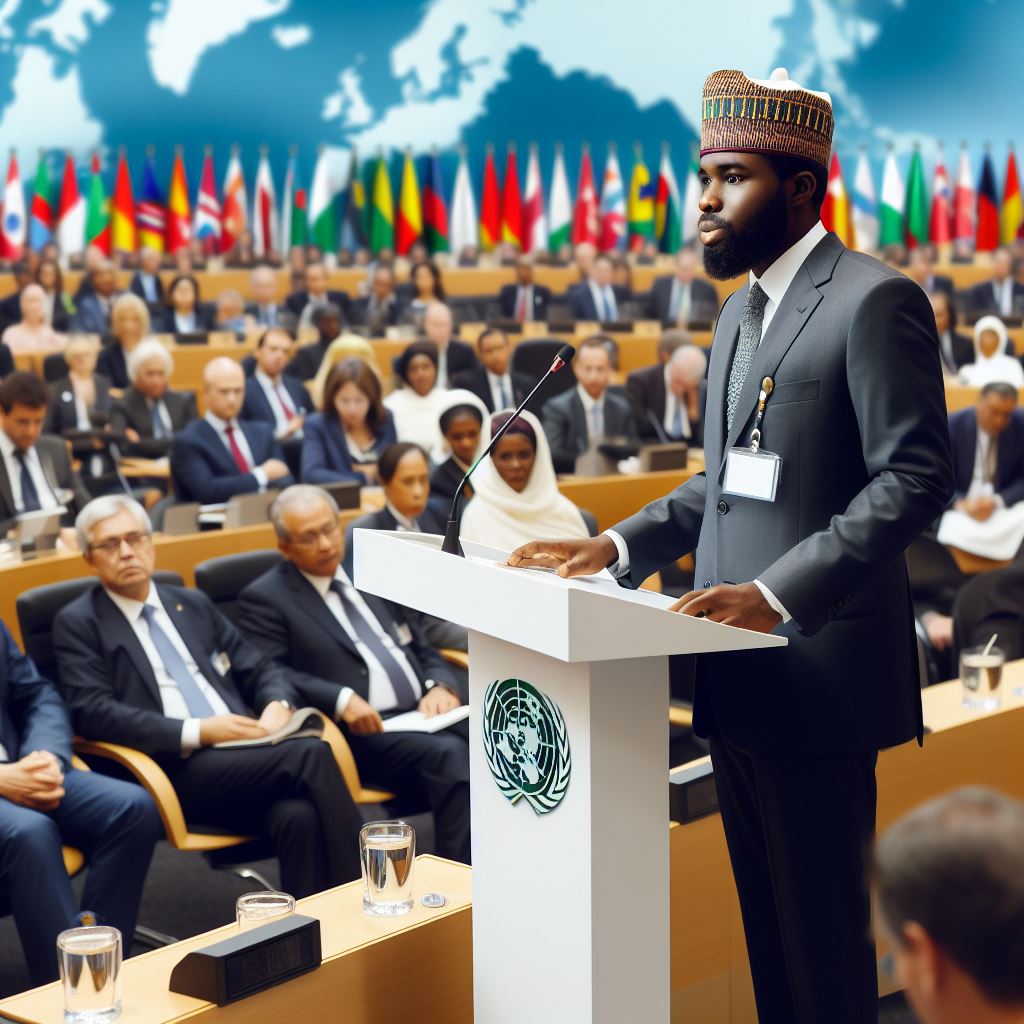Introduction
This blog post examines the role of Nigeria in Global Politics and International Relations by analyzing its regional influence, economic power, and security challenges.
Nigeria holds significant importance in global politics as the most populous country in Africa with a diversified economy.
Nigeria, with a population of over 200 million people, plays a crucial role in shaping African politics and policies.
The country’s geographical location in West Africa grants it strategic influence over neighboring nations.
Nigeria’s economy, fueled by oil exports, has allowed it to become a significant player in global economic affairs.
As a member of the Organization of Petroleum Exporting Countries (OPEC), Nigeria’s decisions impact global oil prices and energy security.
Furthermore, Nigeria’s demographic weight and economic potential make it an attractive destination for foreign investments.
However, Nigeria faces numerous security challenges, including terrorism, ethnic tensions, and the Boko Haram insurgency.
The government’s efforts to address these issues demonstrate Nigeria’s commitment to maintaining stability and peace within the region.
Nigeria’s active participation in regional organizations, such as the African Union and the Economic Community of West African States, allows it to exert influence on continental issues.
Moreover, Nigeria’s role in peacekeeping missions across Africa showcases its commitment to resolving conflicts and promoting regional stability.
In essence, Nigeria’s significance in global politics stems from its regional influence, economic power, and efforts to tackle security challenges.
By understanding Nigeria’s role through an international relations lens, we gain insights into its impact on global affairs.
Historical context
Nigeria plays a pivotal role in shaping global politics through its diplomatic engagements in various international relations.
Nigeria’s role in the decolonization process
Nigeria, a country rich in history and diversity, has played a crucial role in shaping global politics through its active participation in various initiatives and organizations.
To understand Nigeria’s role in global politics, it is essential to examine its historical context and the factors that have influenced its foreign policy decisions.
In the decolonization process, Nigeria emerged as a key player, supporting and advocating for the independence of African nations.
With its own struggle for independence against British colonial rule, Nigeria understood the importance of self-determination for African countries.
This historical experience shaped Nigeria’s commitment to decolonization and its active role in supporting other African nations in gaining freedom.
Establishment and participation in regional organizations (AU, ECOWAS)
Nigeria’s establishment and participation in regional organizations like the AU and ECOWAS have been instrumental in shaping its foreign policy.
The AU, formed in 2002, aims to promote unity and cooperation among African nations.
Nigeria’s involvement in the AU allows it to align its interests with other African countries, promoting peace, stability, and economic development on the continent.
Similarly, Nigeria’s participation in ECOWAS, a regional economic community, has provided avenues for increased regional cooperation and integration.
Through ECOWAS, Nigeria has contributed to the resolution of conflicts, the promotion of trade, and the establishment of common policies within West Africa.
This regional engagement has allowed Nigeria to extend its influence beyond its borders and strengthen its position in global politics.
Influence of former leaders in shaping Nigeria’s foreign policy
Nigeria’s foreign policy has also been shaped by the influence of former leaders who played significant roles in the country’s history.
Nnamdi Azikiwe, Nigeria’s first president, emphasized the need for African unity and cooperation.
His Pan-Africanist ideals influenced Nigeria’s foreign policy, pushing for solidarity among African nations.
Another influential leader, Olusegun Obasanjo, who served as Nigeria’s president from 1999 to 2007, was a strong advocate for peacekeeping and conflict resolution.
His involvement in international mediation efforts, such as the resolution of the Liberian civil war and the Darfur crisis, showcased Nigeria’s commitment to promoting peace and stability in Africa.
In fact, Nigeria’s role in global politics is deeply rooted in its historical context.
From its involvement in the decolonization process to its active participation in regional organizations, Nigeria has consistently demonstrated its commitment to African unity, peace, and development.
The influence of former leaders like Nnamdi Azikiwe and Olusegun Obasanjo has further shaped Nigeria’s foreign policy, highlighting its contributions to international relations.
As Nigeria continues to evolve in the global landscape, its historical legacy and active engagement will undoubtedly play a significant role in shaping its future role in global politics.
Read: Comparing International Relations Curricula: Nigeria vs. the World
Geopolitics and Strategic Positioning
In the realm of international relations, the alliances of Nigeria and partnerships shape regional and global politics.
Nigeria, with its geographical location and vast resources, plays a significant role in global politics.
Its position as the largest economy in Africa amplifies its influence on the international stage.
Nigeria as the Largest Economy in Africa
With a GDP of over $450 billion, Nigeria holds the top spot as Africa’s largest economy.
This economic prowess not only attracts foreign investments but also gives Nigeria a stronger voice in global political discussions.
Transform Your Career with Expert Guidance
Get personalized mentorship consulting that’s tailored to your unique path. Our expert advice is actionable and exclusive.
Get StartedThe country’s economic strength provides it with the leverage necessary to negotiate trade agreements and establish partnerships with other nations.
Nigeria’s ever-growing economy ensures that its concerns are taken seriously on the international platform.
Resources and Potential for Regional Leadership
Nigeria’s vast resources, including oil, natural gas, minerals, and agricultural produce, further enhance its position in global politics.
These resources attract foreign interests and have the potential to propel Nigeria into a regional leadership role.
As one of the top oil-producing countries in the world, Nigeria plays a vital role in global energy security.
Its ability to supply oil to various regions not only strengthens its ties with other countries but also grants it significant influence in shaping global energy policies.
Besides energy resources, Nigeria’s agricultural sector presents immense opportunities for regional leadership.
The country’s fertile lands and favorable climate allow for large-scale production of crops, making it a potential food hub for Africa and beyond.
Influence on Neighboring Countries and Regional Conflicts
Nigeria’s strategic positioning and economic influence also extend to its neighboring countries and regional conflicts.
As a regional power, Nigeria actively engages in mediating conflicts and promoting peace and stability in West Africa.
The country’s efforts in combating terrorism and insurgency, particularly through its involvement in the Multinational Joint Task Force, demonstrate Nigeria’s commitment to regional security.
By collaborating with neighboring countries, Nigeria aims to eradicate the threat of terrorism and promote peace and stability in the region.
Nigeria’s economic magnetism attracts migrants from neighboring countries, creating both challenges and opportunities.
The influx of migrants places pressure on Nigeria’s resources and infrastructure, but it also allows for cultural exchange and potential economic growth.
By navigating its relationships with neighboring countries and actively participating in regional organizations such as the Economic Community of West African States (ECOWAS), Nigeria asserts its influence and shapes regional politics.
In short, Nigeria’s role in global politics is shaped by its geopolitical positioning, economic strength, and influence on neighboring countries.
As the largest economy in Africa, Nigeria’s prominence in global discussions and decision-making processes is heightened.
Its resources and potential for regional leadership further solidify its position on the international stage.
Nigeria’s involvement in regional conflicts and commitment to maintaining peace and stability in West Africa showcases its influential role in shaping regional politics.
Read: Challenges Facing Tourism Education in Nigeria Today
Diplomatic relations
The policy of Nigeria and decisions in global politics significantly impact African and international relations.
Nigeria’s engagement with international organizations
Nigeria, as a member of the United Nations, plays a crucial role in shaping global policies and addressing international challenges.
The country actively participates in various UN bodies, including the General Assembly, the Security Council, and specialized agencies.
Moreover, Nigeria’s involvement in the World Trade Organization demonstrates its commitment to global trade and economic cooperation.
The country actively contributes to discussions on trade policies, facilitates negotiations, and advocates for fair and inclusive trade practices.
Bilateral relationships with major powers
Nigeria recognizes the importance of establishing and nurturing strong bilateral ties with major global powers.
The country maintains robust diplomatic relationships with the United States, China, and the European Union.
The relationship with the United States is multifaceted, involving collaborations in various sectors, including security, education, health, and economic development.
Nigeria values the strategic partnership with the U.S. and engages in regular discussions and exchanges to strengthen ties between the two nations.
In recent years, Nigeria has significantly deepened its economic and political ties with China.
The two countries engage in extensive trade, investment, and infrastructure projects, fostering mutual benefits and cooperation.
The European Union is also an important partner for Nigeria.
The country collaborates with the EU on issues such as human rights, good governance, trade, and development.
Nigeria actively participates in dialogue and negotiations with the EU to enhance cooperation and address shared challenges.
Contributions to peacekeeping missions and conflict resolution
Nigeria has been actively involved in peacekeeping efforts across different regions of the world.
As one of the largest contributors of troops to United Nations peacekeeping operations, Nigeria plays a crucial role in maintaining international peace and security.
The country has deployed troops and police personnel to several conflict zones, including Liberia, Sierra Leone, Sudan, and Mali.
Nigerian peacekeepers work alongside other nations to facilitate ceasefire agreements, protect civilians, and support post-conflict reconstruction.
Nigeria’s experience in managing internal conflicts, such as the Niger Delta crisis and Boko Haram insurgency, has also positioned the country as an important player in conflict resolution.
Through regional cooperation and diplomatic efforts, Nigeria actively contributes to resolving conflicts and promoting stability in Africa and beyond.
In general, Nigeria’s role in global politics is significant and multifaceted.
The country actively engages with international organizations, maintains bilateral relationships with major global powers, and contributes to peacekeeping missions and conflict resolution efforts.
Nigeria’s active involvement on the global stage underscores its commitment to shaping international relations and fostering cooperation for global peace and development.
Read: Comparing International Relations Curricula: Nigeria vs. the World

Challenges and constraints
Understanding the role of Nigeria in global politics is crucial for comprehending the intricate fabric of international relations in Africa and the broader world.
Nigeria faces various challenges and constraints that affect its role in global politics.
These include internal political instability and governance issues, the Boko Haram insurgency and terrorism threats, as well as economic challenges and dependency on oil.
Internal political instability and governance issues
Internal political instability and governance issues have been a recurring problem in Nigeria.
The country has experienced numerous military coups and political unrest, leading to a lack of stable leadership.
This creates difficulties in formulating and implementing consistent foreign policy objectives.
Boko Haram insurgency and terrorism threats
The Boko Haram insurgency poses a significant threat to Nigeria’s security and stability.
This extremist group has carried out numerous attacks, resulting in the loss of thousands of lives and the displacement of millions of people.
Nigeria’s response to this insurgency has been met with limited success, which undermines its credibility and influence on the international stage.
Economic challenges and dependency on oil
Nigeria faces challenges due to its heavy reliance on oil revenue.
Fluctuations in global oil prices have a direct impact on the country’s economy, making it vulnerable to external shocks.
This economic dependency hinders Nigeria’s ability to diversify its economy and strengthen its position in global politics.
In addition to these challenges, corruption remains a significant constraint on Nigeria’s role in global politics.
Widespread corruption not only undermines the country’s governance structures but also erodes its international reputation
This limits Nigeria’s ability to attract foreign investments and form partnerships with other countries.
Steps taken by Nigeria towards asserting itself in global politics
Despite these challenges and constraints, Nigeria has taken steps towards asserting itself in global politics.
The country has played an active role in regional security initiatives, such as the Multinational Joint Task Force against Boko Haram.
It has also participated in peacekeeping missions under the United Nations, demonstrating its commitment to global peace and security.
Nigeria’s size and population also give it the potential to be a regional power in Africa.
As the largest economy on the continent, Nigeria has the capacity to influence regional dynamics and shape the African Union’s agenda.
However, internal challenges must be addressed for Nigeria to fully realize its potential as a global player.
To overcome its internal political instability and governance issues, Nigeria needs to prioritize good governance and establish strong democratic institutions.
This will not only enhance its credibility but also attract foreign investments, boosting its economy and influence in global politics.
Addressing the Boko Haram insurgency requires a multifaceted approach that includes military interventions, socio-economic development, and dialogue.
By effectively combating this threat, Nigeria can reclaim its status as a stable and secure country, thereby improving its standing in global politics.
To mitigate economic challenges and reduce dependency on oil, Nigeria must diversify its economy and promote sectors such as agriculture, manufacturing, and technology.
This will create job opportunities, reduce poverty, and increase Nigeria’s resilience in the face of global economic fluctuations.
Nigeria must tackle corruption through comprehensive reforms and ensure the enforcement of transparency and accountability measures.
This will not only strengthen the country’s institutions but also improve its reputation and attractiveness to global partners.
In review, Nigeria faces significant challenges and constraints that affect its role in global politics.
However, by addressing internal political instability and governance issues, combating the Boko Haram insurgency, diversifying its economy, and tackling corruption, Nigeria can overcome these obstacles and enhance its influence on the international stage.
As Africa’s most populous nation and largest economy, Nigeria has the potential to assert itself as a key player in shaping global politics.
Read: The Evolution of International Relations Studies in Nigeria: A History
Current Foreign Policy Objectives
Nigeria plays a pivotal role in global politics and international relations due to its vast resources and strategic geographical location
With a population of over 200 million and being the largest economy in Africa, Nigeria holds significant influence in regional and global affairs.
Focus on Economic Diplomacy and Attracting Foreign Investments
Economic diplomacy and attracting foreign investments have become key pillars of Nigeria’s foreign policy.
Building diplomatic ties and partnerships is crucial in order to facilitate economic growth and development.
Nigeria aims to attract foreign investments by improving the business environment, implementing economic reforms, and providing incentives to potential investors.
The focus on economic diplomacy aligns with Nigeria’s vision to diversify its economy and reduce its dependence on oil revenue.
Promoting African Unity and Pan-Africanism
Promoting African unity and Pan-Africanism is another important objective for Nigeria.
The country believes that a united Africa is more likely to effectively address common challenges, such as poverty, conflict, and underdevelopment.
Nigeria actively participates in regional organizations like the African Union, ECOWAS, and NEPAD to promote peace, stability, and economic integration across Africa.
By fostering stronger ties with other African nations, Nigeria aims to enhance its influence and contribute to the continent’s progress.
Climate Change and Environmental Issues
Climate change and environmental issues have gained prominence in Nigeria’s foreign policy agenda.
Recognizing the devastating consequences of climate change, Nigeria seeks global cooperation and commitment to reduce greenhouse gas emissions and mitigate the impacts of climate change.
Nigeria has ratified international agreements like the Paris Agreement and actively participates in climate change conferences to advocate for sustainable practices and policies.
Environmental issues such as deforestation, desertification, and pollution are also addressed through bilateral and multilateral partnerships.
In a nutshell, Nigeria’s role in global politics is anchored by its current foreign policy objectives.
By focusing on economic diplomacy and attracting foreign investments, Nigeria aims to boost its economy and enhance its global standing.
Promoting African unity and Pan-Africanism allows Nigeria to play a leadership role in the continent’s development and progress.
Addressing climate change and environmental issues demonstrates Nigeria’s commitment to sustainable development and international cooperation.
As Nigeria continues to assert its influence, it becomes an increasingly important player in the shaping of global politics.
Read: Benefits of Pursuing a Diplomacy Degree in Nigeria
Conclusion
Nigeria plays a significant role in global politics, with both its strengths and weaknesses.
On one hand, Nigeria’s strengths lie in its population size, natural resources, and military capabilities.
However, the country faces challenges such as corruption, ethnic tensions, and inadequate infrastructure.
Despite these weaknesses, Nigeria has the potential to make a greater impact in international relations in the future.
With the right reforms, Nigeria can leverage its economic growth and diplomatic influence to address global issues.
As Africa’s largest economy and most populous nation, Nigeria has the ability to shape regional dynamics.
Additionally, Nigeria’s participation in peacekeeping missions demonstrates its commitment to global peace and security.
Looking ahead, Nigeria’s future involvement in international relations will depend on its domestic stability and leadership.
If it can effectively manage internal challenges and foster inclusive development, Nigeria can become a key player.
The country has the potential to promote regional integration, mediate conflicts, and contribute to global development.
Nigeria’s role in global politics is pivotal, and its actions have the potential to shape the international landscape.




